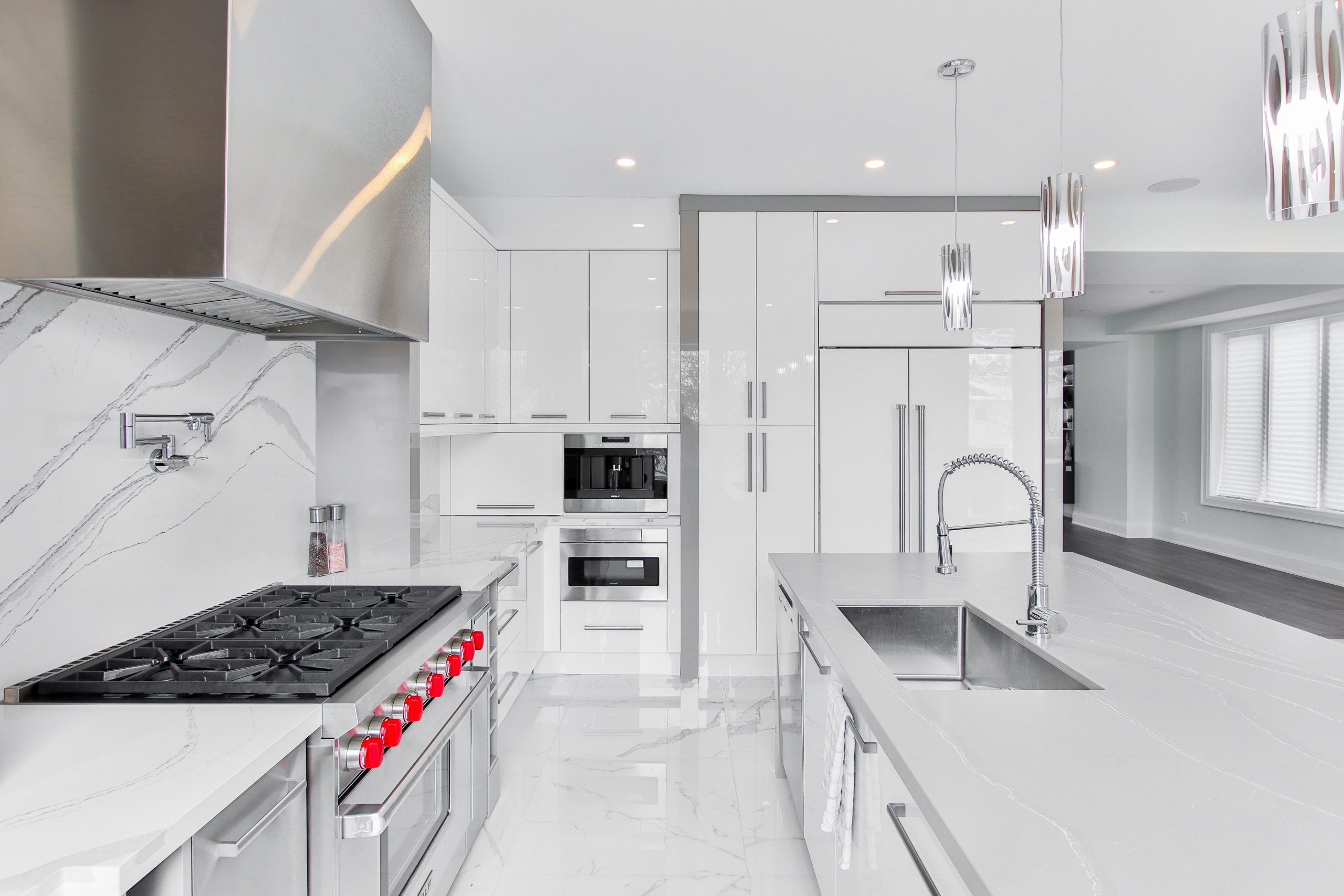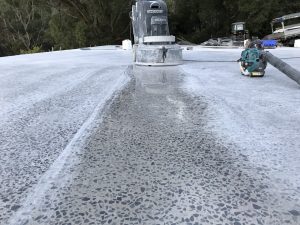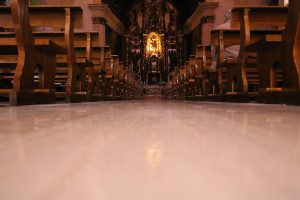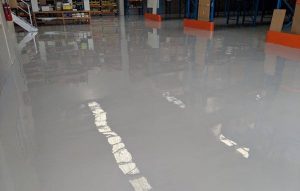Commercial kitchen epoxy floor coating refer to a type of floor coating that is applied in commercial kitchens, food processing facilities, and other industrial kitchens. The primary purpose of an epoxy floor coating is to provide a durable and sanitary surface that can withstand the high foot traffic, heavy equipment, and spills that occur in these environments.
Aside from durability and longevity, the importance of epoxy floor coatings in commercial kitchens lies into two factors:
- Chemical Resistance – An important benefit of commercial kitchen epoxy floor coating is their resistance to chemicals and other substances. These coatings are designed to resist the effects of common chemicals used in commercial kitchens, such as cleaning agents, grease, and oil. This makes epoxy floor coating a much more practical and cost-effective option for commercial kitchens compared to other flooring options that are more susceptible to chemical damage.
- Sanitation – In addition to their durability and chemical resistance, commercial kitchen epoxy floor coating is also highly sanitary. These coatings provide a smooth and seamless surface that is easy to clean, reducing the risk of bacteria and other pathogens from accumulating on the floor. Additionally, epoxy floor coatings are non-porous, meaning they do not allow liquids or other substances to penetrate into the surface, further reducing the risk of contamination.
Commercial kitchen epoxy floor coating is one of the most popular flooring options for commercial and industrial buildings, with a growing demand for residential applications as well. While no flooring system is perfect, for many applications, the benefits of epoxy resin outweigh the drawbacks. Here are the most important pros and cons of commercial kitchen epoxy floor coating to assist you in your flooring project.
Pros and Cons of Commercial Kitchen Epoxy Floor Coating
PROS OF COMMERCIAL KITCHEN EPOXY FLOOR COATING
Damage Resistance
Unlike many other types of flooring for residential and commercial spaces, commercial kitchen epoxy floor coating is resistant to damage caused by normal wear and tear. It will not crack, peel, or erode like laminate, wood, or other types of flooring. Cured epoxy is resistant to moisture and can withstand extreme weight. Furthermore, epoxy flooring has numerous top coating options (such as urethane) that increase its strength and durability.
Less Wear and Tear
Using commercial kitchen epoxy floor coating is an excellent way to maintain the beauty of your kitchen floor. The smooth finish of an epoxy coating provides additional protection to your kitchen appliances also. Epoxy flooring non slip is a great advantage also to avoid unwanted accidents in your kitchen.
Economical
Commercial kitchen epoxy floor coating is relatively inexpensive when compared to many other types of flooring coatings. Furthermore, installation does not necessitate a total overhaul; Commercial kitchen epoxy floor coating can be applied directly on top of pre-existing concrete, wood, or steel. Replacement/reapplication costs are even lower, resulting in an efficient lifetime cost for epoxy flooring. Epoxy floor coating is low-maintenance and require few, if any, repairs, which increases their long-term value.
Long-Term and Durable
While the lifespan of an epoxy installation varies according to location, wear and tear, and purpose, this flooring application is guaranteed to outlast its competitors. The only material that can compete epoxy flooring is concrete, but it must be properly sealed and maintained. Furthermore, an epoxy floor coating required concrete beneath it in the first place. Concrete is made extremely durable by epoxy floor coating. They also have anti-fatigue properties and can be easily rolled out on cement without the use of mortar or glue. With proper maintenance your commercial kitchen epoxy floor coating should last for many years. Some applications claim to last up to 20 years if you acquire quality epoxy flooring services from professionals.
Pleasant to the Eye
Whatever look you want for your space; commercial kitchen epoxy floor coating is both beautiful and long-lasting. Epoxy floor coating is available in a variety of finishes, including granite, metallic, marbled, and a plethora of color combinations. Many customers choose epoxy installation to cover up their existing flooring, which may be deteriorating or simply unappealing. Epoxy is a full-coverage, aesthetically pleasing coating.
Easy to Clean
Epoxy floor coatings are non-porous and easy to clean, which makes them a popular choice for commercial kitchens. The surface is smooth and seamless, which helps to reduce the growth of bacteria and other microorganisms.
CONS OF COMMERCIAL KITCHEN EPOXY FLOOR COATING
Long Curing Period
Depending on the type of epoxy floor coating and the scope of the project, epoxy flooring systems can take several days to cure completely. It usually takes 72 hours for applications to dry and cure completely. However, epoxy can be applied in smaller home areas such as garages in as little as 24 hours. The curing time can be inconvenient if the epoxy flooring is being installed inside a home or business where there is likely to be a lot of foot traffic, or if you live in a humid climate, as this will lengthen the drying time.
Slippery If Wet
Because epoxy is non-porous, when wet, it can become extremely slippery. This is especially dangerous if the epoxy is applied in a location where small children or the elderly will be walking on the flooring on a regular basis. This disadvantage has mitigating factors, all of which can be added or adjusted during the application process and should be discussed with your epoxy flooring experts, but will incur additional costs. The commercial kitchen epoxy floor coating could become mostly non-slip with the addition of these materials! Everything is dependent on the epoxy flooring application you select.
Fumes of High Application
Wet epoxy emits an unpleasant odor during the application process. To protect themselves, epoxy workers wear masks and safety goggles because the fumes are not only unpleasant to smell but can also be toxic. Highly asthmatic individuals should exercise extreme caution when installing epoxy flooring and should consult with a health professional before making the decision to include it in their home. To protect anyone nearby from the hazards of epoxy fumes, the area receiving an epoxy application should be thoroughly ventilated. However, once the epoxy has fully cured, there is no longer a smell unless the coating is sanded further, allowing epoxy resin dust into the air space.
Sensitivity of Commercial Kitchen Epoxy Floor Coating
Epoxy flooring must be installed exactly according to the manufacturer’s instructions. The flooring will not last as long if it is not installed properly. The coating is also easily scratched. It’s extremely difficult to remove paint overspray from it. When the humidity levels are low, the coating should be applied only during that time of year. This is due to the fact that moisture can have an impact on the durability of these floors.
Temporary
One of the major drawbacks of using epoxy flooring is that it’s temporary. Regardless of its durability and resistance, it will need to be replaced at some point. Epoxy floors, unlike other types of flooring, are subject to normal wear and tear. To keep things looking good, apply a fresh coat of epoxy. This cannot be avoided, particularly if heavy objects are dropped on the floor’s surface. Chipping and cracking are common problems. Though minor annoyances, chips can eventually lead to a large area of the coat peeling off the floor. As they roll over the damaged area, wheeled carts and appliance wheels become entangled. If this occurs, the floor must be repaired.
Types of Commercial Kitchen Epoxy Floor Coating
Solid Epoxy
Solid epoxy floor coatings are made up of 100% solids epoxy, making them one of the most durable and resilient flooring options available. This type of epoxy is ideal for commercial kitchens that require a strong and long-lasting flooring option.
100% solids epoxy
100% solids epoxy floor coatings provide a durable and seamless surface that is resistant to impacts, abrasions, and chemicals. This type of epoxy is ideal for commercial kitchens that experience frequent spills and other accidents, as it is designed to withstand the effects of these substances.
Waterborne Epoxy
Waterborne epoxy floor coatings are a type of epoxy floor coating that uses water as a solvent rather than a chemical solvent. This makes waterborne epoxy a more eco-friendly option for commercial kitchens, as it does not produce harmful emissions. Additionally, waterborne epoxy is also easier to install, making it a more practical option for commercial kitchens that need to minimize downtime.
Moisture-cured Urethane
Moisture-cured urethane floor coatings are a type of floor coating that cure when exposed to moisture in the air. This type of coating provides a durable and long-lasting surface that is resistant to impacts, abrasions, and chemicals. Moisture-cured urethane is also a more eco-friendly option compared to other floor coating options, as it does not require the use of solvents.
Choosing the Right Commercial Kitchen Epoxy Floor Coating
Environment
The environment of a commercial kitchen is harsh and demanding, which requires a floor coating that can withstand spills, splashes, high foot traffic, and frequent cleaning. The right epoxy floor coating should be durable, resistant to chemicals, and easy to clean.
Determine the Level of Traffic
When selecting an epoxy floor coating for a commercial kitchen, it is essential to consider the level of traffic the floor will receive. For example, if the kitchen experiences high foot traffic, it is recommended to choose an epoxy coating with high wear resistance. In contrast, a kitchen with low foot traffic may require a less durable coating.
Evaluate the Budget
The cost of a commercial kitchen epoxy floor coating can vary depending on the size of the kitchen, the type of coating, and the complexity of the installation process. But it is important to keep in mind that epoxy flooring is a cost-effective option compared to other flooring options such as ceramic tiles, which can be expensive to install and maintain.
Consider Maintenance Requirements
Regular cleaning and maintenance are crucial to prolong the life of an epoxy floor coating in a commercial kitchen. The right coating should be easy to clean and require minimal resurfacing or sealing. Some coatings may require a sealing layer to protect against spills, while others may not. It is essential to consider the maintenance requirements when choosing an epoxy floor coating for a commercial kitchen.
Commercial Kitchen Epoxy Floor Coating: Maintenance Requirements
Regular Cleaning
Regular cleaning is a crucial aspect of maintaining the life of an epoxy floor coating in a commercial kitchen. The smooth, non-porous surface of an epoxy coating makes it easy to clean, which helps to reduce the growth of bacteria and other microorganisms. Regular cleaning with warm water and a mild detergent will keep the surface looking new and reduce the need for resurfacing.
Resurfacing
Commercial kitchen epoxy floor coating is durable, but over time, the surface may become scratched or stained. In such cases, resurfacing may be required to restore the original appearance of the coating. Resurfacing involves removing the existing coating and applying a new layer of epoxy. The frequency of resurfacing will depend on the level of foot traffic, the use of harsh chemicals, and the overall maintenance of the coating.
Sealing
In some cases, a sealing layer may be required to protect the surface of an epoxy coating. Sealing helps to reduce the penetration of spills and other liquids, which can cause staining. Sealing also helps to reduce the need for frequent resurfacing, which can be time-consuming and expensive. However, it is important to choose the right sealing product, as some sealers can yellow or discolor the surface of the coating over time.
Ready to Experience the Benefits of Commercial Kitchen Epoxy Floor Coating?
Commercial kitchen epoxy floor coating is a highly practical and cost-effective option for commercial kitchens and industrial buildings. Their key benefits include chemical resistance, high sanitation standards, durability, resistance to damage, and easy maintenance. The aesthetic appeal of epoxy floor coatings can also enhance the overall look of your commercial kitchen.
When choosing the best flooring option for your commercial kitchen, consider the benefits of epoxy floor coatings and weigh them against the cons, such as the long curing period. To ensure the highest quality and durability, consider seeking professional service for your commercial kitchen epoxy floor coating project.
Here at Renucrete, we offer a range of commercial kitchen epoxy floor coating services that are designed to meet the unique needs of your space. Our team of experts has the skills and experience necessary to provide a long-lasting and beautiful solution for your kitchen – whether you’re looking for high quality epoxy floor coatings, salt and pepper polished concrete, or polished concrete finish.
Contact us for all your commercial kitchen flooring needs.




